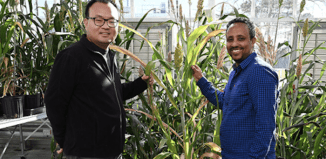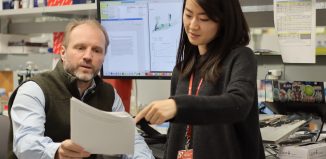Private groups fund research into rare childhood cancer
This group will not let pain or loss defeat them. Instead, they are banding together to fight a common enemy.
Several foundations, the Friends of T.J. Foundation, the Christina Renna Foundation, the Michelle Paternoster Foundation for Sarcoma Research and the Clark Gillies Foundation, are contributing about $300,000 to fund research into a rare form of deadly pediatric cancer called rhabdomyosarcoma. RMS is a tumor of the connective tissue that typically involves muscle cells attached to bones.
The groups are backing a research partnership between Cold Spring Harbor Laboratory Assistant Professor Chris Vakoc and Charles Keller, the scientific director at the Children’s Cancer Therapy Development Institute, Fort Collins, Colo., to find a cure for a disease that afflicts adults and children equally. For children who get cancer, it is the most common soft tissue cancer.
The directors from these groups got together at a special Banbury conference of world leaders in RMS in May and pooled their resources.
The foundations “all gelled,” said Phil Renna, the director of operations for public affairs at CSHL and the co-founder of the Christina Renna Foundation. Renna’s foundation is named after his daughter, who died in 2007, a year after her diagnosis. Renna is “happy to say that we are able to put together” this research focus.
Vakoc and Keller have “hit it off” after CSHL president and CEO Bruce Stillman helped form the collaboration, Vakoc said. The research team hopes to “leverage what my lab does with epigenetics with [Keller’s] expertise in the clinical realm.”
Vakoc said his lab is invested in the discovery of cancer drug targets. He asks “cancer cells what they need to grow,” while they also explore what makes cancer cells different from normal cells.
Working on leukemia, Vakoc has already found a drug target, called Brd4. He plans to take a similar approach to RMS.
Vakoc explained that his lab uses a technique called RNA interference, in which he methodically searches for protein targets. He also uses a gene knockout technique called CRISPR. Vakoc is inhibiting parts of proteins in animal models of this disease and examining how the sarcoma responds.
“This is a way to provide a road map for where drug discovery should be,” Vakoc said.
Once he and his lab finds these targets, they can look for existing drugs approved for other clinical applications that might work against this cancer. His first round of screens have nominated some targets, although it is too early to know if these will prove useful in treating RMS, Vakoc said.
With Brd4, Vakoc found a target in which an inhibitor already existed. Based on his research, scientists are now conducting a clinical trial to study its effects.
Keller used to see patients but now conducts research full time. Any discovery with RMS might have implications for other diseases, he said. The most commonly known inherited predisposition to cancer, called Li-Fraumeni syndrome, was originally reported as a condition of inherited RMS. This syndrome, Keller added, has mutations in the p53 genes, which is one of the most well-studied genes in cancer of any type.
“Pediatric cancers can lead to fundamental types of discoveries that are later paradigms for adults cancers,” Keller explained. Keller also recognized Stillman’s role in creating the partnership with Vakoc. “There is something very personal about [Stillman’s] desire to make a change for this disease,” Keller offered.
Indeed, after meeting with some of the families affected by RMS, the members of Vakoc’s lab have contributed more of their time to seeking a cure. Vakoc said his lab members attended a one-hour talk Keller gave that included people from the foundations. Keller discussed the unique challenges of this cancer.
“Seeing the reactions and hearing the questions families have puts a different perspective on cancer research” from what scientists who study molecules in a lab “normally encounter,” Vakoc said.
He praised his lab mates for coming in on the weekends for a few extra hours of work. They are also planning to volunteer at the Morgan Center, a group that supports preschool children with cancer.
Keller said he’s thrilled with his collaborator. He said his mentor, Nobel Prize winner Mario Capecchi had a saying: “Go with the best, no matter where they are.” That, he explained, is Vakoc.
Keller and Vakoc are using the philanthropic support to involve Novartis in a grant they have submitted to the National Institutes of Health, Keller said.
Paul Paternoster, who lost his wife Michelle to RMS last year, explained that it is “nice to drive by Cold Spring Harbor Laboratory every day and think about” how researchers are working toward a cure. “We took all the pain and negative energy” that comes from battling this disease “and turned it into something positive.”






